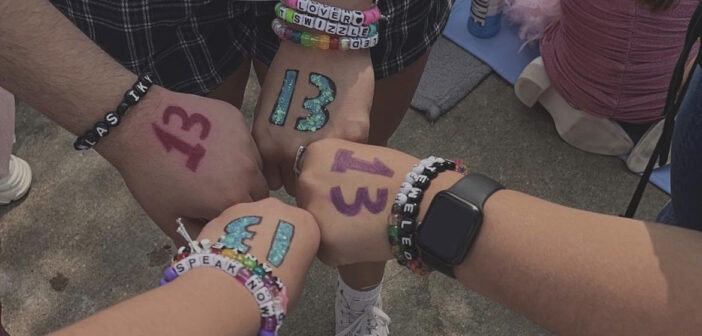Fangirls are often portrayed as frenzied young teenage girls. How true is that stereotype and is it harmful?
“The hive-mind battle-cry of teenage girls scenting boy flesh.”
This is a quote from a 2012 Guardian review of a One Direction concert. It exemplifies the tendency for media depictions of female fans, especially young fangirls, to rely on animalistic language. They portray them as frenzied, hysterical or out-of-control. Researchers say such stereotypical representations marginalize women and deny the diversity of female fan experiences.
There is a prevailing assumption that women, particularly young women with an interest in phenomena like boy bands, are often perceived as not truly grasping the profound significance of such media. Instead, they are unfairly viewed as merely succumbing to frivolous fixations without thoughtful engagement.
Problematic portrayals
An analysis of media language reveals patterns of stereotyping fangirls.
A study by Renita Coleman and Annie Lyons analyzed U.S. and U.K. music journalism from 2010-2015, comparing coverage of boy bands like One Direction to non-boy bands.
In the study, they found that many stories about boy bands described fangirls as “having bad or immature taste, perceiving fans to like a band for sex appeal or unserious reasons, describing fans as obsessive, hysterical, frivolous, silly, or unable to control their emotions.”
Stories about boy bands rely heavily on stereotypes. They designate fangirls as overly emotional, immature and focused on celebrity crushes rather than the music itself.
This occurs despite the fact that boy bands produce multiple critically acclaimed albums topping charts globally.
A review of a One Direction performance in Australia likens the experience to a cult phenomenon: “Since their arrival in the country, a wave of hysteria has trailed One Direction, and their concert unfolded as a collective expression of frenzy. The audience, predominantly composed of teenage girls, exhibited an electric and fervent energy.”
Problematic age and gender intersections
Along with patronizing language, media representations often position the female fan experience as inappropriate and embarrassing when it intersects with age.
Adult women who are fans of media or celebrities perceived as youthful or feminine often face criticism. Their interests are labeled as peculiar or unsettling. On the contrary, older male enthusiasts who embrace interests associated with masculinity are seen differently. People generally view them more positively, considering them “passionate.”
Such coverage enforces rigid age norms based on gender. It also excludes intersectional fans from cultural spaces catering only to white men deemed serious aficionados.
Adult fans
A 2020 study by Ysabel Gerrard examined adult women fans of teen TV shows like “Pretty Little Liars.” They endured criticism for not aging out of youth-oriented media texts. These fans distanced themselves from perceptions of immaturity by labeling younger female fans as frenzied “fangirls.” They painted younger fans as being focused on celebrity obsessions rather than nuanced interpretations.
For instance, the study introduces Amanda, a married, forty-something, heterosexual woman and “Pretty Little Liars” fan. Despite her active involvement, including running social media fan accounts and co-organizing conventions, Amanda expresses a deliberate effort to dissociate from the stereotypes fangirls have.
She emphasizes her professionalism and rational behavior. She also draws a contrast with convention volunteers whom she perceives as exhibiting hyperfeminine and “out-of-control” fangirl behaviors.
Amanda’s attempt to distance herself from the fangirl stereotype is evident when she describes her Facebook fan page. She describes it as having a “selective fan base” that is “older” and “more mature.” Amanda characterizes her fans as having a “higher level of intelligence” and understanding the show. By doing this, she constructs her engagement with “Pretty Little Liars” as more rational and acceptable.
This distinction allows her to legitimize her fan identity in the face of societal norms that might view adult women fans of teen TV shows as unconventional.
Invalidating authentic connections
Along with ageism and sexism, media stereotypes overlook how deeply bonded female fans feel to pop culture texts and fan communities as emotional support systems.
A series of studies by psychologists Jaye Derrick and Shira Gabriel provide evidence that consuming favored media, especially TV shows, can alleviate loneliness and rejection by fulfilling belongingness needs.
In their research, viewing a favored television program emerged as one of the top two most frequent activities participants engaged in while feeling lonely. Remarkably, the only other activity reported with the same frequency was listening to favored music.
Furthermore, participants expressed that they felt the least lonely when engaged in the act of viewing their favored television programs.
Derrick and Gabriel’s work underscores the powerful role that media consumption, especially through television programs, plays in fulfilling individuals’ belongingness needs and serving as a form of social surrogacy.
Yet, frequent media portrayals overlook these authentic emotional connections female fans build through pop culture. News coverage focuses on extremely visible responses seen as confirming the frenzied fangirl stereotype of youth-dominated spaces devoid of critical thought.
Too often, though, reductive stereotypes overpower the nuanced personal stories of female fandom.
Toxic consequences
Incomplete media portrayals contribute to harmful consequences, reinforcing stereotypes that undermine female fans’ voices and artistic appreciation. This normalization perpetuates the marginalization of women in fields like entertainment journalism and creative leadership.
Stereotypical language also harms groups like teenage girls, denying them recognition for their interests.
Assumed immaturity becomes a justification for online gendered harassment targeting outspoken female fans. It makes enthusiasm seem like a dangerous loss of control.
The resulting undermining of female fan cultures eliminates crucial safe spaces for community support and self-expression during vulnerable developmental phases for youth.
Progress in representation
However, increasing visibility sparks gradual changes in representations and attitudes toward female fan cultures. Celebrities themselves speak out addressing double standards, as when Taylor Swift criticized sexist coverage undermining her artistry.
Derrick and Gabriel’s research provides scientific evidence on the psychological benefits of media fandom appreciation commonly labeled as just juvenile obsessions.
The responsibility lies with creators, including journalists, to promote diversity and counter stereotyping.

